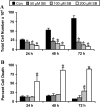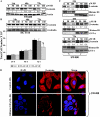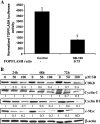Silibinin suppresses growth of human colorectal carcinoma SW480 cells in culture and xenograft through down-regulation of beta-catenin-dependent signaling
- PMID: 20454513
- PMCID: PMC2864479
- DOI: 10.1593/neo.10188
Silibinin suppresses growth of human colorectal carcinoma SW480 cells in culture and xenograft through down-regulation of beta-catenin-dependent signaling
Abstract
Mutations in APC/beta-catenin resulting in an aberrant activation of Wnt/beta-catenin pathway are common in colorectal cancer (CRC), suggesting that targeting the beta-catenin pathway with chemopreventive/anticancer agents could be a potential translational approach to control CRC. Using human CRC cell lines harboring mutant (SW480) versus wildtype (HCT116) APC gene and alteration in beta-catenin pathway, herein we performed both in vitro and in vivo studies to examine for the first time whether silibinin targets beta-catenin pathway in its efficacy against CRC. Silibinin treatment inhibited cell growth, induced cell death, and decreased nuclear and cytoplasmic levels of beta-catenin in SW480 but not in HCT116 cells, suggesting its selective effect on the beta-catenin pathway and associated biologic responses. Other studies, therefore, were performed only in SW480 cells where silibinin significantly decreased beta-catenin-dependent T-cell factor-4 (TCF-4) transcriptional activity and protein expression of beta-catenin target genes such as c-Myc and cyclin D1. Silibinin also decreased cyclin-dependent kinase 8 (CDK8), a CRC oncoprotein that positively regulates beta-catenin activity, and cyclin C expression. In a SW480 tumor xenograft study, 100- and 200-mg/kg doses of silibinin feeding for 6 weeks inhibited tumor growth by 26% to 46% (P < .001). Analyses of xenografts showed that similar to cell culture findings, silibinin decreases proliferation and expression of beta-catenin, cyclin D1, c-Myc, and CDK8 but induces apoptosis in vivo. Together, these findings suggest that silibinin inhibits the growth of SW480 tumors carrying the mutant APC gene by down-regulating CDK8 and beta-catenin signaling and, therefore, could be an effective agent against CRC.
Figures






References
-
- Jemal A, Siegel R, Ward E, Hao Y, Xu J, Thun MJ. Cancer statistics, 2009. CA Cancer J Clin. 2009;59:225–249. - PubMed
-
- Mandel JS, Church TR, Bond JH, Ederer F, Geisser MS, Mongin SJ, Snover DC, Schuman LM. The effect of fecal occult-blood screening on the incidence of colorectal cancer. N Engl J Med. 2000;343:1603–1607. - PubMed
-
- Espey DK, Wu XC, Swan J, Wiggins C, Jim MA, Ward E, Wingo PA, Howe HL, Ries LA, Miller BA, et al. Annual report to the nation on the status of cancer, 1975–2004, featuring cancer in American Indians and Alaska Natives. Cancer. 2007;110:2119–2152. - PubMed
-
- Wilkins T, Reynolds PL. Colorectal cancer: a summary of the evidence for screening and prevention. Am Fam Physician. 2008;78:1385–1392. - PubMed
-
- Half E, Arber N. Colon cancer: preventive agents and the present status of chemoprevention. Expert Opin Pharmacother. 2009;10:211–219. - PubMed
Publication types
MeSH terms
Substances
Grants and funding
LinkOut - more resources
Full Text Sources
Other Literature Sources
Medical
Research Materials
